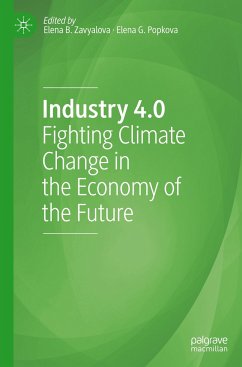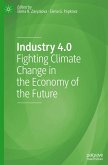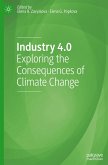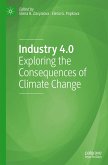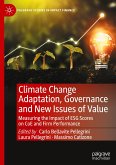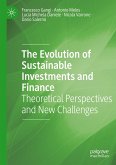Industry 4.0
Fighting Climate Change in the Economy of the Future
Herausgegeben:Zavyalova, Elena B.; Popkova, Elena G.
Industry 4.0
Fighting Climate Change in the Economy of the Future
Herausgegeben:Zavyalova, Elena B.; Popkova, Elena G.
- Broschiertes Buch
- Merkliste
- Auf die Merkliste
- Bewerten Bewerten
- Teilen
- Produkt teilen
- Produkterinnerung
- Produkterinnerung
This book presents a scientific view of fighting climate change in the economy of the future, the foundations of which are being set around the world. The authors substantiate the potential of Industry 4.0 in stimulating sustainable development in environmental protection and preservation of natural resources. This book considers the modern experience of fighting climate change based on possibilities of Industry 4.0 at the national scale in view of developed and developing countries with a special focus on Russia and at the corporate scale by the example of transnational corporations. It…mehr
Andere Kunden interessierten sich auch für
![Industry 4.0 Industry 4.0]() Industry 4.0119,99 €
Industry 4.0119,99 €![Industry 4.0 Industry 4.0]() Industry 4.0127,99 €
Industry 4.0127,99 €![Industry 4.0 Industry 4.0]() Industry 4.0127,99 €
Industry 4.0127,99 €![Industry 4.0 Industry 4.0]() Stefan HengIndustry 4.024,99 €
Stefan HengIndustry 4.024,99 €![Climate Change Adaptation, Governance and New Issues of Value Climate Change Adaptation, Governance and New Issues of Value]() Climate Change Adaptation, Governance and New Issues of Value82,99 €
Climate Change Adaptation, Governance and New Issues of Value82,99 €![The Evolution of Sustainable Investments and Finance The Evolution of Sustainable Investments and Finance]() Francesco GangiThe Evolution of Sustainable Investments and Finance139,09 €
Francesco GangiThe Evolution of Sustainable Investments and Finance139,09 €![The Evolution of Sustainable Investments and Finance The Evolution of Sustainable Investments and Finance]() Francesco GangiThe Evolution of Sustainable Investments and Finance139,09 €
Francesco GangiThe Evolution of Sustainable Investments and Finance139,09 €-
-
-
This book presents a scientific view of fighting climate change in the economy of the future, the foundations of which are being set around the world. The authors substantiate the potential of Industry 4.0 in stimulating sustainable development in environmental protection and preservation of natural resources. This book considers the modern experience of fighting climate change based on possibilities of Industry 4.0 at the national scale in view of developed and developing countries with a special focus on Russia and at the corporate scale by the example of transnational corporations. It determines the future contribution of Industry 4.0 into development of responsible production and consumption, and compiles the "outlines" of "green" economy in Industry 4.0. It offers recommendations for control of climate change in Industry 4.0, and presents the authors' vision of ecological responsibility in Industry 4.0 for implementing the sustainable development goals. This book will be of interest to academics and practitioners interested in climate change and development of Industry 4.0, as well contributing to a national economic policy for fighting climate change and corporate strategies of sustainable development in Industry 4.0.
Produktdetails
- Produktdetails
- Verlag: Palgrave Macmillan / Springer International Publishing / Springer, Berlin
- Artikelnr. des Verlages: 978-3-030-79498-9
- 1st edition 2022
- Seitenzahl: 528
- Erscheinungstermin: 11. Februar 2023
- Englisch
- Abmessung: 235mm x 155mm x 29mm
- Gewicht: 791g
- ISBN-13: 9783030794989
- ISBN-10: 3030794989
- Artikelnr.: 67288569
- Herstellerkennzeichnung
- Springer-Verlag GmbH
- Tiergartenstr. 17
- 69121 Heidelberg
- ProductSafety@springernature.com
- Verlag: Palgrave Macmillan / Springer International Publishing / Springer, Berlin
- Artikelnr. des Verlages: 978-3-030-79498-9
- 1st edition 2022
- Seitenzahl: 528
- Erscheinungstermin: 11. Februar 2023
- Englisch
- Abmessung: 235mm x 155mm x 29mm
- Gewicht: 791g
- ISBN-13: 9783030794989
- ISBN-10: 3030794989
- Artikelnr.: 67288569
- Herstellerkennzeichnung
- Springer-Verlag GmbH
- Tiergartenstr. 17
- 69121 Heidelberg
- ProductSafety@springernature.com
Elena B. Zavyalova is Doctor of Economics, Professor and Head of the Economic Policy Department at MGIMO University, Moscow, Russia. She teaches Russian Economy, Economy of the Former Soviet Countries, National Economic Security, Economic Policy, Public-Private Partnership, Sustainable Development and International Development Assistance. She is an active participant in programs of the World Bank and Beijing Normal University (China). She is a co-author of several research papers for the Ministry of Economic Development of the Russian Federation, author of over scientific 60 publications. Elena G. Popkova is Doctor of Economics and Professor at MGIMO University, Moscow, Russia. She is President of the autonomous non-profit organization "Institute of Scientific Communications". Elena G. Popkova organizes Russian and international scientific and practical conferences and is the editor and author of collective monographs, and serves as a guest editor of international scientific journals. She has published more than 300 works in Russian and foreign peer-reviewed scientific journals and books
Part I The modern experience of fighting climate change based on the opportunities of Industry 4.0.- Chapter 1 Industry 4.0 as the basis of fighting climate change in developed countries.- Chapter 2 Developing countries on the path to sustainable development: technological provision of Industry 4.0.- Chapter 3 Fighting climate change in Russia based on the leading technologies of Industry 4.0: strategic foundations and current tendencies.- Chapter 4 Experience of the leading transnational corporations in development of "green" productions based on the digital technologies of Industry 4.0.- Chapter 5 Experience of organization of responsible production in the transnational network business based on the opportunities of Industry 4.0.- Part II. Contribution of Industry 4.0 into development of responsible production and consumption.- Chapter 6 Digital opportunities of increase of energy efficiency of economy based on Smart Grid.- Chapter 7 The strategy of development of Russia's energy sphere in Industry 4.0 until 2030, for implementing the sustainable development goals.- Chapter 8 Development of responsible consumption based on machine visions in Industry 4.0.- Chapter 9 The concept of organization and control of production waste of a "smart" company based on AI.- Chapter 10 The algorithm of institutionalization and development of responsible production and consumption in Russia in Industry 4.0 for implementing the sustainable development goals.- Part III. "Green" economy in Industry 4.0.- Chapter 11 The mechanism of implementing "green" innovations in "smart" production under AI control.- Chapter 12 The model of development of "green" production in Industry 4.0.- Chapter 13 Digital growth points of "green" economy in Industry 4.0.- Chapter 14 "Green" investments as a growth vector of "green" economy in Industry 4.0.- Chapter 15 "Road map" of development of "green" economy in Russia in Industry 4.0 for implementing the sustainable development goals.- Part 4. Control ofclimate change in Industry 4.0.- Chapter 16 Digital state and public monitoring and management of the processes of environment protection in Industry 4.0.- Chapter 17 Perspectives of development of ecological non-profit organizations based on the possibilities of Industry 4.0.- Chapter 18 Creation of "smart" homes as a perspective direction of increasing the resource efficiency of households and development of responsible consumption.- Chapter 19 Control of climate change and reduction of the negative influence of economy on environment in a "smart" region.- Chapter 20 The concept of control and management of climate change in Russia based on the possibilities of Industry 4.0 for implementing the sustainable development goals.- Part V. Ecological responsibility in Industry 4.0 for implementing the sustainable development goals.- Chapter 21 Development of the practice of online corporate ecological reports and the specifics of its institutionalization in emerging markets for implementing the sustainable development goals.- Chapter 22 The model of organization of eco-friendly production based on AI for implementing the sustainable development goals.- Chapter 23 The concept of corporate management of ecological responsibility of business based on the Internet of Things for implementing the sustainable development goals.- Chapter 24 The mechanism of increase of ecological responsibility of households based on ubiquitous computing for implementing the sustainable development goals.- Chapter 25 The program-oriented approach to development of ecological responsibility in Russia in Industry 4.0 for implementing the sustainable development goals.
Part I The modern experience of fighting climate change based on the opportunities of Industry 4.0.- Chapter 1 Industry 4.0 as the basis of fighting climate change in developed countries.- Chapter 2 Developing countries on the path to sustainable development: technological provision of Industry 4.0.- Chapter 3 Fighting climate change in Russia based on the leading technologies of Industry 4.0: strategic foundations and current tendencies.- Chapter 4 Experience of the leading transnational corporations in development of "green" productions based on the digital technologies of Industry 4.0.- Chapter 5 Experience of organization of responsible production in the transnational network business based on the opportunities of Industry 4.0.- Part II. Contribution of Industry 4.0 into development of responsible production and consumption.- Chapter 6 Digital opportunities of increase of energy efficiency of economy based on Smart Grid.- Chapter 7 The strategy of development of Russia's energy sphere in Industry 4.0 until 2030, for implementing the sustainable development goals.- Chapter 8 Development of responsible consumption based on machine visions in Industry 4.0.- Chapter 9 The concept of organization and control of production waste of a "smart" company based on AI.- Chapter 10 The algorithm of institutionalization and development of responsible production and consumption in Russia in Industry 4.0 for implementing the sustainable development goals.- Part III. "Green" economy in Industry 4.0.- Chapter 11 The mechanism of implementing "green" innovations in "smart" production under AI control.- Chapter 12 The model of development of "green" production in Industry 4.0.- Chapter 13 Digital growth points of "green" economy in Industry 4.0.- Chapter 14 "Green" investments as a growth vector of "green" economy in Industry 4.0.- Chapter 15 "Road map" of development of "green" economy in Russia in Industry 4.0 for implementing the sustainable development goals.- Part 4. Control ofclimate change in Industry 4.0.- Chapter 16 Digital state and public monitoring and management of the processes of environment protection in Industry 4.0.- Chapter 17 Perspectives of development of ecological non-profit organizations based on the possibilities of Industry 4.0.- Chapter 18 Creation of "smart" homes as a perspective direction of increasing the resource efficiency of households and development of responsible consumption.- Chapter 19 Control of climate change and reduction of the negative influence of economy on environment in a "smart" region.- Chapter 20 The concept of control and management of climate change in Russia based on the possibilities of Industry 4.0 for implementing the sustainable development goals.- Part V. Ecological responsibility in Industry 4.0 for implementing the sustainable development goals.- Chapter 21 Development of the practice of online corporate ecological reports and the specifics of its institutionalization in emerging markets for implementing the sustainable development goals.- Chapter 22 The model of organization of eco-friendly production based on AI for implementing the sustainable development goals.- Chapter 23 The concept of corporate management of ecological responsibility of business based on the Internet of Things for implementing the sustainable development goals.- Chapter 24 The mechanism of increase of ecological responsibility of households based on ubiquitous computing for implementing the sustainable development goals.- Chapter 25 The program-oriented approach to development of ecological responsibility in Russia in Industry 4.0 for implementing the sustainable development goals.

